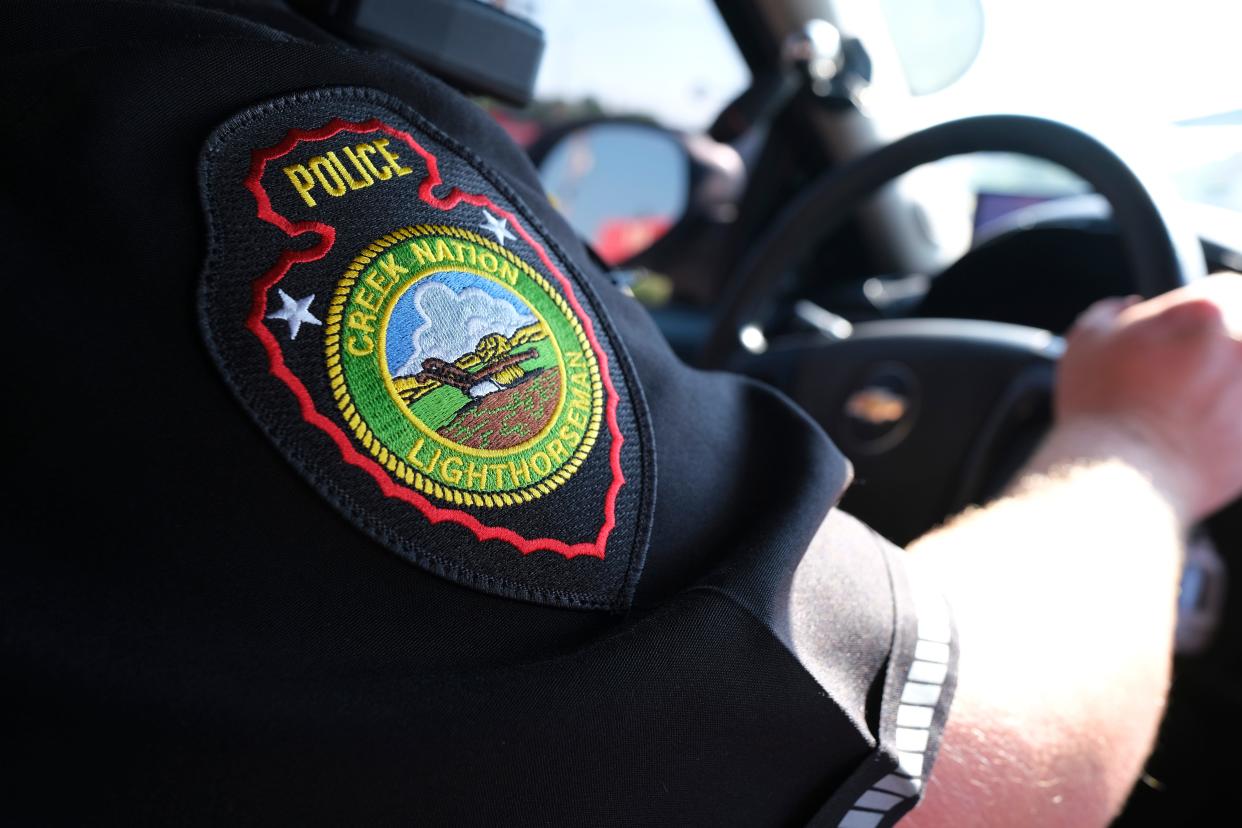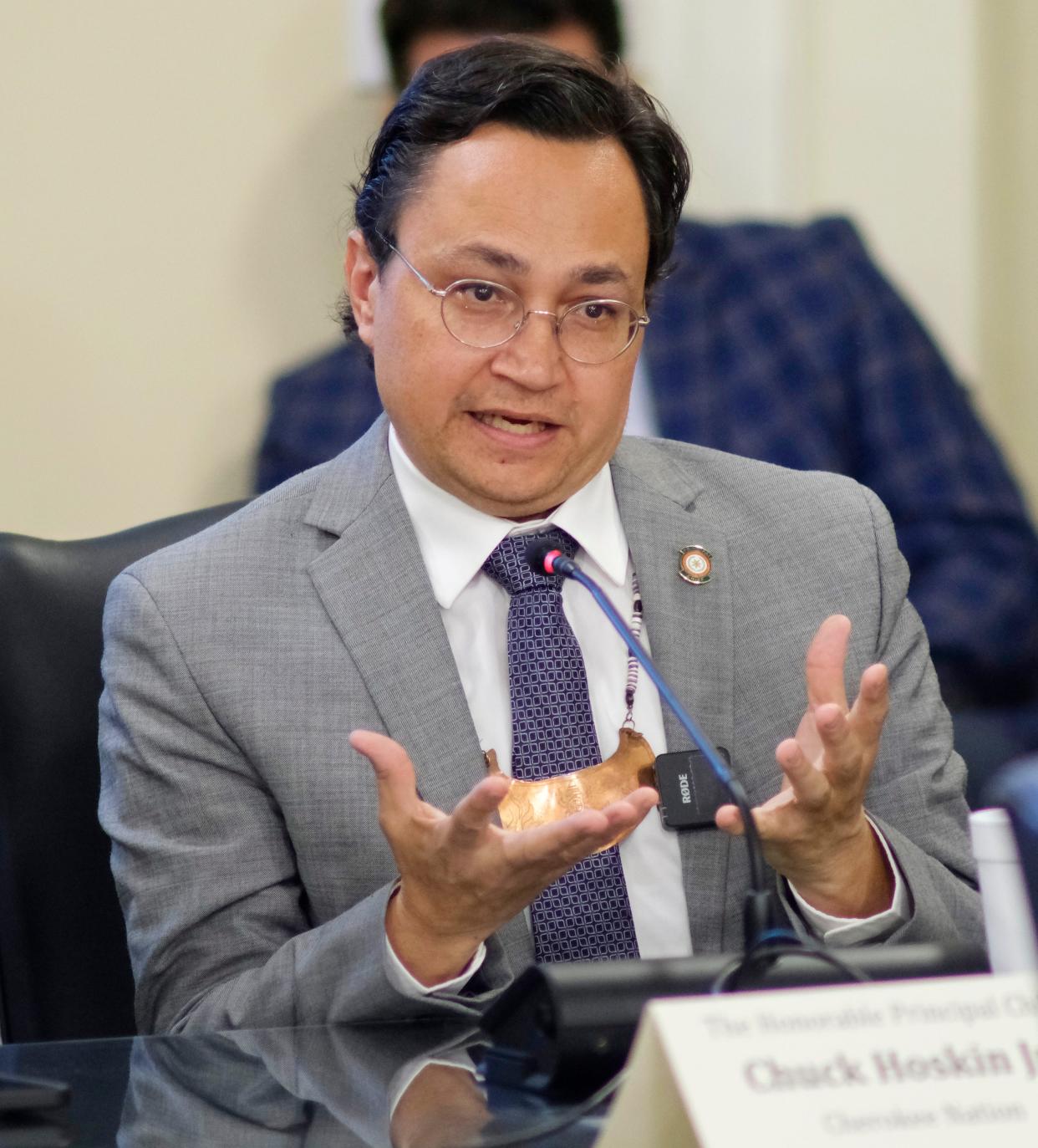Oklahoma tribes need more money for policing, Cherokee, Muscogee officials tell Congress

Oklahoma tribes need more money from Congress to expand and maintain their criminal justice systems almost four years after the McGirt v. Oklahoma ruling, representatives of the Cherokee and Muscogee nations told members of Congress on Tuesday.
Chuck Hoskin Jr., the principal chief of the Cherokee Nation, called for annual funding to help tribes address the effects of the landmark U.S. Supreme Court decision on tribal reservations.
Carson Ball, the self governance coordinator for the Muscogee Nation, said the tribe’s Lighthorse Police force would need $12 million — three times the amount it currently receives — to police its eastern Oklahoma reservation at full capacity.
“The levels (of funding) are inadequate to the amount of needs we are facing on the ground,” he said.
More: Jimcy McGirt to be released from Oklahoma prison 4 years after pivotal Supreme Court ruling
Federal funding barely begins to cover law enforcement needs on tribal reservations, leaders say
Ball and Hoskin were among the dozens of tribal officials who testified during hearings before a House appropriations subcommittee that oversees spending by the Interior Department and its Bureau of Indian Affairs. The hearings started Tuesday and were set to continue Wednesday.
The federal government has treaty and trust obligations to provide basic services such as health care, education and law enforcement to tribal nations.
But tribal officials said over and over Tuesday that the funding they receive is woefully inadequate, particularly when it comes to policing large reservations.
John Pettigrew, the acting police chief of the Oglala Sioux Tribe in South Dakota, estimated that federal funding covered only 15% of the actual need on the tribe's Pine Ridge Reservation. At times, only four police officers are on duty to patrol a reservation the size of Connecticut, he said.
“Fifteen percent — in what world is that acceptable?” he said.
Several Oklahoma tribes also impacted by McGirt ruling
Several tribes in Oklahoma, including the Cherokee and Muscogee nations, are in unique situations because their reservations only recently regained legal recognition after the 2020 McGirt v. Oklahoma decision.
State courts had prosecuted crimes involving Native Americans on those lands. After the decision, tribal and federal authorities took over most of those cases.
The Cherokee Nation went from trying 100 criminal cases a year to more than 10,000, Hoskin testified. He said his northeastern Oklahoma tribe, which is the largest in the U.S., had increased its annual public safety budget by $35 million to meet the increased demand.

Hoskin called on Congress to help Oklahoma tribes continue to expand their justice systems with direct funding, noting that lawmakers had approved similar payments the past three years.
“We want to see continued funding for tribes directly impacted by the McGirt decision,” he said.
More: An Oklahoma trooper ticketed a driver over her tribal license plate. What happened next?
Ball specifically asked for more money to pay for the costs of detaining tribal citizens accused of committing crimes on the Muscogee reservation, which covers much of Tulsa. He noted the tribe received $8 million the last budget cycle, but said that amount is not guaranteed and likely would need to be increased over time.
Rep. Chellie Pingree, of Maine, the ranking Democrat on the subcommittee, said she and other lawmakers were looking to Oklahoma Republican Rep. Tom Cole to make sure critical needs such as McGirt-related expenses are funded. Cole, a citizen of the Chickasaw Nation, leads the powerful House Appropriations Committee.
“If we start with a very small allocation, then everybody gets these cuts that are completely unconscionable, honestly, to make,” she said.
Funding requests to Congress stemming from the McGirt decision have become common in recent years. The money hasn’t just gone to tribal governments. Lawmakers also have agreed to devote millions more to federal courts and law enforcement agencies to address the flood of cases moving from state courts to federal courts.
Gov. Kevin Stitt has criticized the state’s loss of power over tribal citizens accused of committing crimes on tribal reservations. He formed a task force in December to suggest ways to fix the “negative effects” of the ruling, including through possible federal legislation.
But Tricia Everest, Oklahoma’s public safety secretary who chairs the task force, said in March that she didn't expect Congress to wade in to the dispute.
Molly Young covers Indigenous affairs. Reach her at mollyyoung@gannett.com or 405-347-3534.
This article originally appeared on Oklahoman: Cherokee, Muscogee nations call for more public safety funding from US
